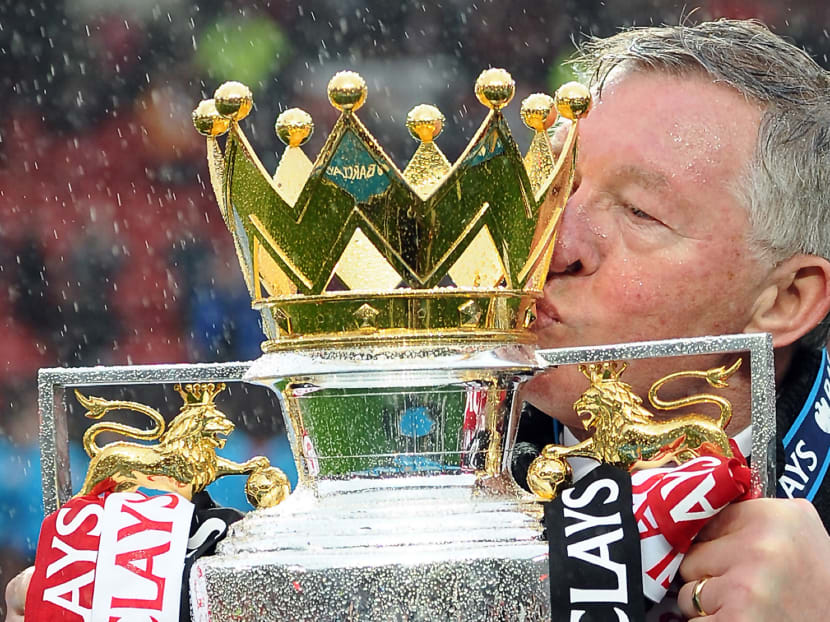Sweet dreams are made of this: Alex Ferguson’s sleeping legacy
MANCHESTER — Alex Ferguson was not one for wishing his players sweet dreams when he was Manchester United manager after a poor performance, but one of his lesser-known legacies is his forward-thinking on sleeping patterns.

Sir Alex Ferguson kisses the Premier League trophy at the end of the English Premier League football match between Manchester United and Swansea City at Old Trafford in Manchester, northwest England, on May 12, 2013. AFP file photo
MANCHESTER — Alex Ferguson was not one for wishing his players sweet dreams when he was Manchester United manager after a poor performance, but one of his lesser-known legacies is his forward-thinking on sleeping patterns.
The legendary United coach can also be thanked by British Cycling, Team Sky and last year’s record-breaking British Olympic team, because without his support, sleep guru Nick Littlehales would never have got the break that propelled him into becoming an essential part of many successful sporting teams.
“I didn’t get my diploma from university, I got it from the media who said I tucked up the Bolton and Manchester United players, including (Cristiano) Ronaldo, and read them bedtime stories,” joked Littlehales, after speaking at the Soccerex Global Convention on Monday (Sept 4).
“In reality though, if it wasn’t for that particular manager, Alex Ferguson, I wouldn’t have had a response about managing one’s sleep.
“I worked locally at the time in Oldham and Alex liked that sort of thing, of helping local people, and I was also recommended to him by his good friend the then Bolton manager Sam Allardyce, who liked trying new things.
“If it was anywhere else in the United Kingdom my letter wouldn’t have got read. Don’t forget at that time there wasn’t such a thing as a sports science person.”
Littlehales said that Ferguson encouraged him to come and sit in the players’ lounge and see if they engaged with him.
“Alex said, ‘let’s take it nice and slow’, but he was very interested in it,” said Littlehales.
“However, only one player came up and engaged with me and that was Ryan Giggs.
“From there it evolved into dealing with some of the England squad at the 1998 World Cup and then a certain bespectacled Frenchman came along at Arsenal (Arsene Wenger) and all of a sudden I was speaking to the whole squad, including the likes of Thierry Henry, as a sleep coach.”
‘CURL UP ON THE FLOOR’
Littlehales, who says the myth of needing eight hours’ straight sleep is bogus and that everyone’s needs are different due to some being morning people and others night owls, says part of his goal is to suggest a more radical recommendation for players or athletes on the eve of a big game.
“To think you can sleep on the eve of an Olympic final or a big match is plainly ridiculous,” he said.
“However, the answer is not sleeping tablets or snus (Scandinavian tobacco powder rubbed on the gums), it is far better not to sleep at all.
“Someone like (British rowing great) Steve Redgrave would not sleep but he would still go out there and destroy the opposition in the final.”
Littlehales, whose book on the topic of managing sleeping patterns has been published in 13 different countries, also recommends that athletes sleep with just a 10-centimetre mattress.
“As a human being you are designed to curl up on the floor,” he said.
“Ethiopian marathon runners haven’t grown up on mattresses.
“If you are hanging off a mountain on a hook you can’t tell them to take their mattress with them.
“Generally my advice is sleep in multi-phases, go away and lie on the floor for 20 minutes every four hours, in the foetal not the dominant position, staring at the wall.”
However, for clients such as Team Sky, Littlehales recommends a ‘bespoke service’.
“Team Sky had the money and we especially focused on the Grand Tours,” sad Littlehales.
“As they are three weeks long and (at) a different hotel every night, we went down to (Bradley) Wiggins’ home and looked at his bed and checked out the environment he slept in.
“So we took (a) single version of the mattress he slept on, plus the odours or the air fresheners he was used to, and advised the team to put fresh bed linen on every night.
“That has now been taken to another level and become a pre-requisite for the Winter Olympics next year and Tokyo in 2020.” AFP








